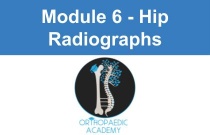Module 6 - Hip Radiographs
Mr. Mohammed As- Sultany
• Dive into advanced techniques for interpreting hip radiographs, emphasizing key anatomical structures and common pathologies. • Improve your diagnostic capabilities with in-depth analysis of hip radiographic views and clinical case scenarios.
Supporting people with Down’s syndrome and dementia
Karen Watchman
1.00 Hours
People with Down’s syndrome enjoy a longer life expectancy now than they ever have before, and are therefore at greater risk of developing conditions associated with ageing, including dementia. The evidence base for the effects of dementia on people with Down’s syndrome is much smaller than that for older people generally, which....
Educating children’s nurses to communicate bad news
Doreen Crawford, Doris Corkin, Jane Coad and Rachel Hollis
1.00 Hours
Some parents are unhappy with the way news is broken to them. This learning module seeks to educate and inform the reflective practitioner on a series of communication strategies to enhance their skills. This is important because the way news is disclosed can affect the way news is accepted and the level of support the family wi....
Managing children with raised intracranial pressure resulting from meningitis
Siba Paul, Joanne Smith, Jessica Green, Adam Smith-Collins and Ravindranath Chinthapalli
Intracranial pathologies in children need urgent identification and management. This learning module describes intracranial pressure and outlines the features and management of meningitis. It is accompanied by an illustrative case study to give an idea of what nurses might encounter in a child presenting with raised intracranial....
Supporting people with Parkinson’s in later life
Nicky Hayes and Suma Surendranath
1.00 Hours
Parkinson’s in old age can be a complex individual condition that affects physical and psychological function and wellbeing. As a result, the needs of different people may vary. However, all older people with Parkinson’s will benefit from access to a specialist, comprehensive old-age assessment and nursing care that understands....
Managing patients with multiple sclerosis: a complex neurological disease
Nikki Embrey
This learning module describes the complex neurological condition multiple sclerosis (MS) and its management. It outlines the pathophysiology and symptoms, the importance of timely access to specialist services for treatment of symptoms, and relapse and disease management. New and emerging therapies for the management of MS, the....
Self-Regulation and Stress for Social Workers
Amar Hamoudi, Ph.D., et al.
1.50 Hours
This CEU course addresses important unanswered questions regarding the impact of stress on self-regulation development including how lasting these effects may be, if there are particular periods of development that are more sensitive to its effects, and how individual differences moderate the impact of stress on self-regulation.....
Spirituality in nursing practice
Melanie Rogers and John Wattis
Spirituality is an important aspect of holistic care that is frequently overlooked. This is because of difficulties in conceptualising spirituality and confusion about how it should be integrated into nursing care. This learning module explores what is meant by spirituality and spiritually competent practice. It examines attitud....
Managing fatigue in adults with multiple sclerosis
Susan Jane Hourihan
1.00 Hours
Fatigue is one of the most common symptoms experienced by people with multiple sclerosis (MS) and has a significant effect on all aspects of daily living and on quality of life. It is important for healthcare professionals working with patients with MS to identify fatigue where present and to be able to offer clinically effectiv....
Teaching students to apply the 6Cs of nursing to their practice
Kathleen Duffy
1.00 Hours
Nurses and midwives are asked to demonstrate the 6Cs (care, compassion, competence, communication, courage and commitment) of nursing in 'everything we do'. Mentors have a crucial role in the provision of health care and in educating nurses and midwives. This learning module aims to provide guidance to mentors on how to integrat....
Caring for patients with haemorrhagic shock
Elizabeth Gallimore
This learning module discusses the clinical features of haemorrhagic shock and the strategies used to manage the condition, focusing on the presenting symptoms, classifications, compensatory mechanisms, physiological changes and nursing interventions. Haemorrhagic shock is a condition of reduced tissue perfusion as a result of t....
The National Opioid Crisis
John Peterson, MD
0.25 Hours
The use of opioids for pain management continues to grow. Addiction to opioids has become common, as the use of prescription opioids for pain management rises. This session will discuss the opioid crisis, the evolution of addiction, treatment modalities, and how to treat the opioid-addicted patient when pain management is requi....
Understanding Hypertension: Treatment and Management
Thom Kim Nguyen, PharmD, BCPS, CTTS
5.00 Hours
Hypertension (HTN) is a common disease that affects millions of Americans without any warning. It is defined as a persistent elevated blood pressure and is a significant risk factor for cardiovascular disease, thus early detection is imperative. Increasing screening and diagnosis of HTN, and improving control of BP with appropri....
The Evolving Practice of Infusion Nurses Placing Central Vascular Access Devices
Cathy Perry, MSN, ANP-BC, VA-BC, CRNI®
0.75 Hours
Nurses have successfully placed peripherally inserted central catheters (PICCs) for more than 30 years. Central vascular access device (CVAD) placement by nurses is increasing in prevalence for reasons including a physician shortage, changes in reimbursement, sepsis protocols, and a history of successful nurse-placed peripherall....
Understanding the Centers for Disease Control and Prevention's National Healthcare Safety Network Criteria
Mary Ann Daehler MS, RN, CRNI®, OCN®
0.75 Hours
Many facilities are reporting hospital-acquired infections (HAIs) to the Centers for Disease Control and Prevention (CDC) through the National Healthcare Safety Network (NHSN). The NHSN criteria provide a standard language for infection surveillance, which allows benchmarking of data. This presentation will explain the criteria....
What is Vasovagal Syncope?
Sunil Kumar
This session will help you understand about syncope and the various different types. It will discuss the mechanism of vasovagal syncope to some extent.
Telephone Consultations
Michael Innes
This session explores the issues that may arise when a consultation is conducted over the telephone, including how to minimise the possible negative factors. The advantages of using the phone are then discussed, following by a presentation of best practice advice.
Ventilator Settings and Alarms (anaesthesia)
John Isaac
0.50 Hours
This session covers the principles of setting up a modern anaesthetic ventilator for a given sized adult patient to provide appropriate ventilation with safe alarm settings.
Venous Access
Hannah Blanshard
0.50 Hours
This session looks at the basics of peripheral intravenous cannulation including the ideal sites for insertion, the size of cannula to use and the need for local anaesthetic. This session presents how to recognize arterial placement in a shocked patient and describes the techniques used in the cannulation of the shocked or diffi....
Vasoactive Agents (Vasopressors)
Jeremy Bewley
0.50 Hours
This session will describe the classification of vasopressors and list the indications for their use.
The Journey Begins - Podcast
Kim Hughes
The journey of CKD for patients transitioning through different locations
Violence and Aggression in the Workplace - Webinar
Dr Sandra Richardson
How to manage and cope with aggression in the workplace
The importance of early diagnosis: how to identify patients with FH for diagnosis and referral
R. Dermot G. Neely
Familial hypercholesterolaemia (FH) is under-diagnosed and under-treated, despite clear evidence-based guidelines for identification and management, and the availability of low-cost, generic, high-intensity statin treatment. Genetic cascade testing is the key to early diagnosis, which can help ensure that this treatment is no lo....
Use of RTLS to Support a Model of Patient-Centered Care
Kevin B. Hoover, MD, PhD
0.75 Hours
The drive for patient-centered, multidisciplinary care is being fueled by payment model changes. To create an optimal environment for this type of care, we have designed an ambulatory care facility that provides each patient access to their own room on check in, much like a hotel. We have also co-localized within the center th....
The Final Days
Chantal Simon and Max Watson
0.25 Hours
Although most terminally ill patients are admitted to a hospital or other institution to die, this session gives GPs a framework with which to manage the last few days of life for patients wishing to die at home.
























